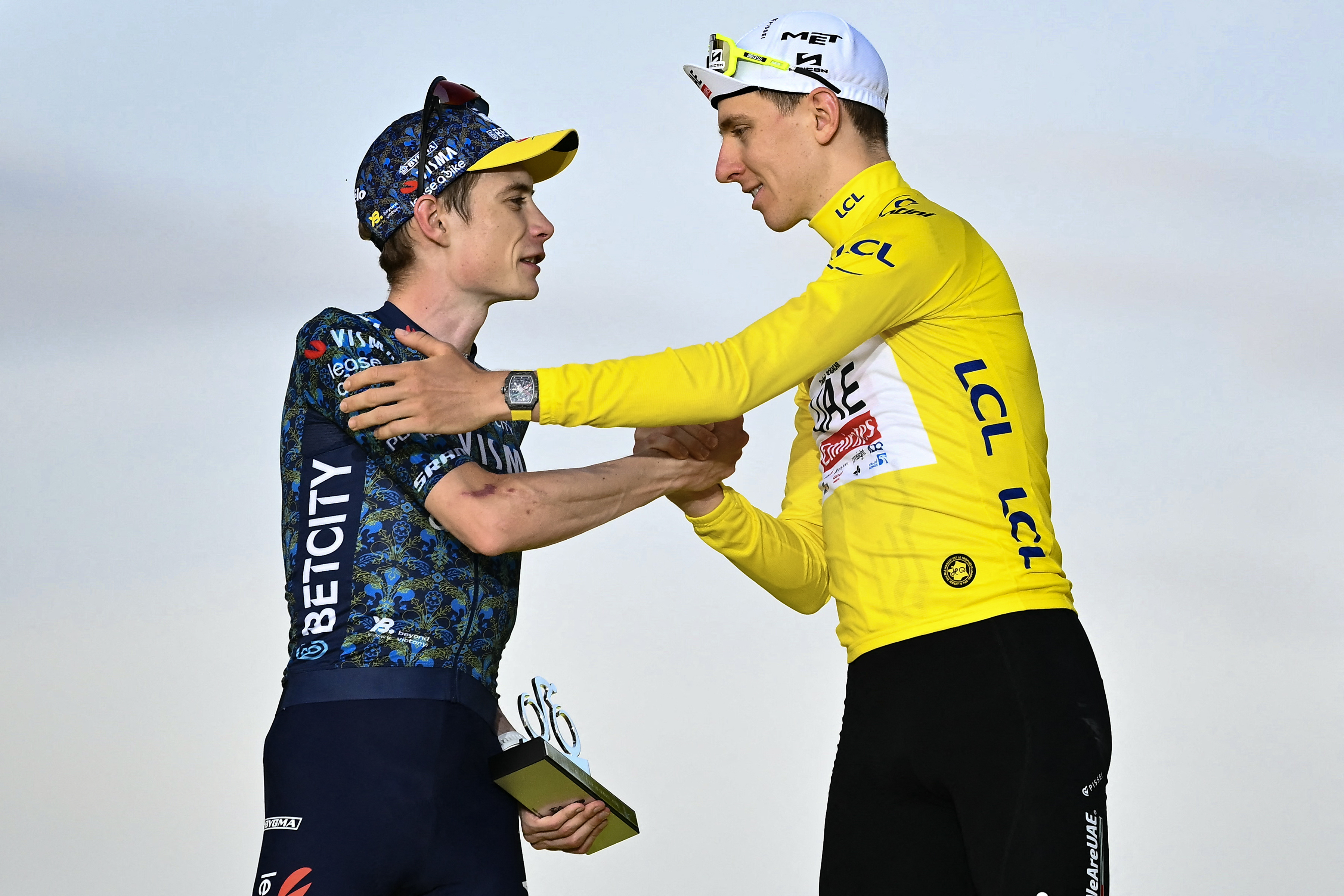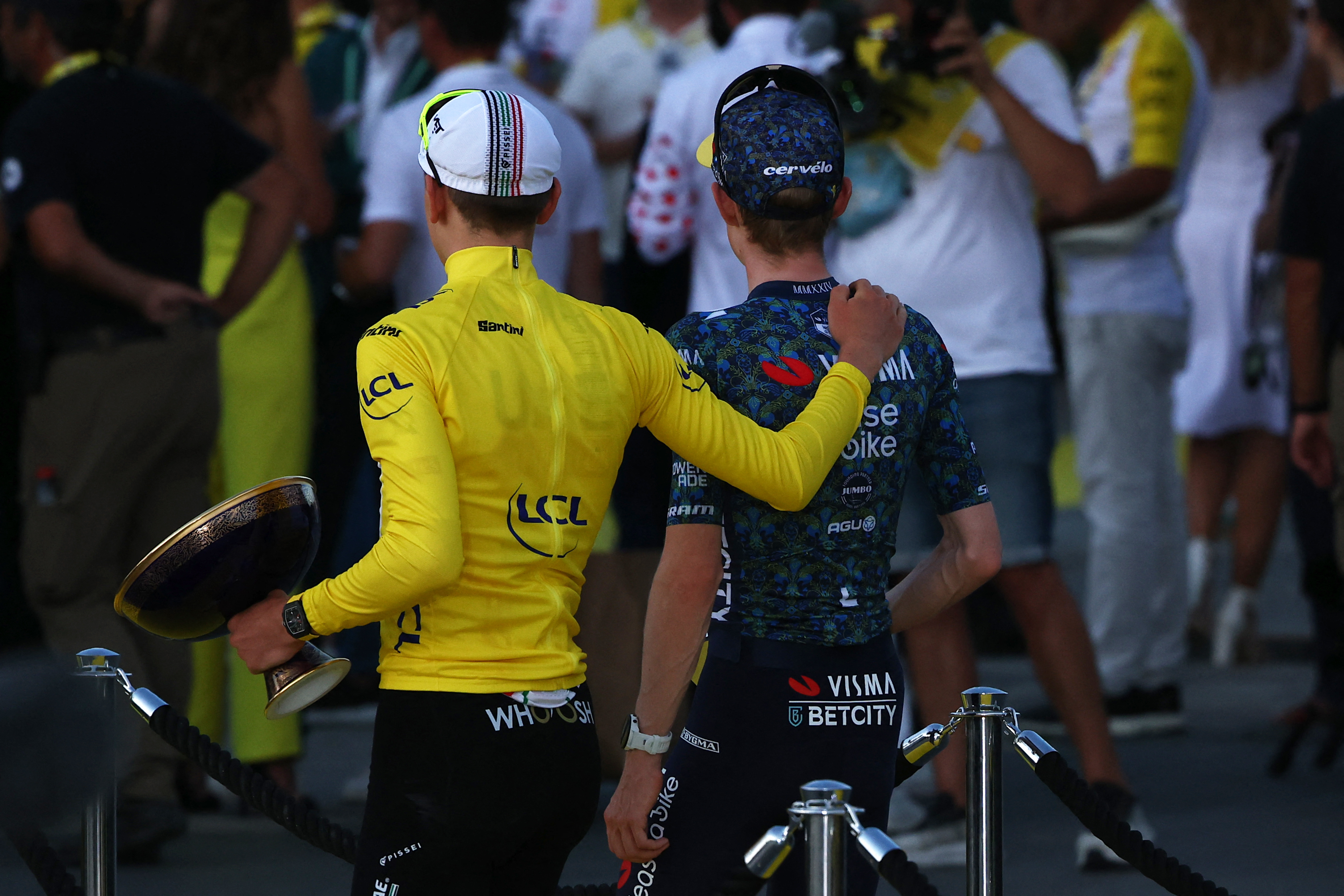Jonas Vingegaard - ‘Maybe with time, I’ll be prouder of second in this Tour de France than my wins’
No Vuelta a España for Dane, rest of 2024 season unclear

2024 Tour de France runner-up and 2022 and 2023 overall winner Jonas Vingegaard (Visma-Lease a Bike) has insisted that his key takeaway from this year’s race is that despite his defeat, the circumstances following his fightback from terrible injuries in April have meant that finishing second almost feels like a victory.
“So of course, I’m not winning the Tour de France, but maybe in a few weeks, when I will have some time to reflect on it, I will be even more proud of second place than the two victories I’ve had,” Vingegaard said on Sunday evening.
After immediately following up his second place in the Col de la Couillole on Saturday with second in the Tour's final time trial - his fourth runner's up spot in a stage of this year’s Tour - Vingegaard's final placing in the final GC, 6:17 down, is his fourth podium finish in as many years in the race. That run of top three places started with second overall behind 2024 winner Tadej Pogačar (UAE Team Emirates) in 2021, then two outright victories in 2022 and 2023 and now second again in 2024.
However, in 2024 the overall lead remained beyond his reach, with Vingegaard's one visit to the winner’s podium before the final line-up at Nice the stage win in Le Lioran.
But as Visma-Lease A Bike management repeatedly reminded media at the Grand Départ in Firenze, even getting to the Tour was an immense victory for the Dane, given his appalling crash this spring. Perhaps unsurprisingly, then, his words in a final press conference late on Sunday evening underlined how proud the 27-year-old was of being able to compete at a high level in the Tour this year, while clearly implying how determined he is to go one step higher again in 2025, too.
“First of all it was very nice for me to be back at a very, very high level," he said. "After everything that happened with the crash, with the setback that I had this year, it was not nice of course, but then to be able to get back like this, to get second in the Tour de France is still a very big result.
“With everything in mind, it might be an even bigger result than actually winning the Tour de France when everything went perfectly. So of course, I’m not winning the Tour de France, but I think when I will have some time to reflect on it in a few weeks, maybe I will be even more proud of second place than the two victories I’ve had.”
The latest race content, interviews, features, reviews and expert buying guides, direct to your inbox!
With no racing since his crash in April, Vingegaard’s performance in the first 10 days of the Tour invited even more optimism than he or the team could perhaps have hoped for.
The only rider able to follow Pogačar when he attacked on the ultra-steep San Luca climb on stage 2 in Bologna, he lost just 38 seconds on the Galibier on stage 4, the key first-week mountain test, which the team put down partly to factors like Pogačar’s greater weight - and hence higher speeds - on the descent. Then after another minimal time loss in the time trial and keeping a rampaging Pogačar under control in an always unpredictable gravel stage, Vingegaard went so far as to outsprint Pogačar in a shock defeat for the Slovenian at Le Lioran. At that point, the Tour seemed wide open, and journalists were even telling Pogačar post-stage that Vingegaard was moving ahead of him in the bigger GC game.
“I think the day I won the stage, I was believing I could win the Tour de France, from thereon and also before,” Vingegaard said. “That was because I knew I had a high level and Plateau de Beille [on stage 15] was my best ever performance on a long climb, a 40-minute climb.
“I was looking at my power numbers and I was pretty incredible myself. But Tadej was stronger, so he deserves to win for sure. It’s really impressive how he rode the Tour.”
As far as La Bonette-Restefond, halfway through stage 19, Vingegaard was still optimistic that he could turn around Pogačar’s three-minute advantage overall, even sending three domestiques up the road to help him out in the event of a counter-attack from the GC peloton.
But it never came. Instead, Vingegaard realised that he was not going to win the Tour that day, and with a radical switch of strategy, he went from all-out offensive to trying to keep a lid on his rivals like third-placed Remco Evenepoel (Soudal-QuickStep)
“On the stage to Isola, I was feeling really bad, when I crossed the line I was totally empty,” he recounted. “Halfway through the stage there I realised, today I will have to change my mindset from trying to attack to just hanging on for dear life on Remco’s wheel.”
However, it wasn´t just about following wheels. Vingegaard fought a brave rearguard action on stage 20 to distance Evenepoel and secure his second place, as well as defeating the Belgian again on Sunday, and with the broader perspective that the end of the race brought, Vingegaard was already focussing on the high points of his Tour. The main one being, of course, that he was able to be in the Tour at all, fighting for a podium and perhaps more for so long.
“I think also for me the highlight is to have a fight like this with Remco and Tadej,” he said. “Of course also for me,[other highlights are] just coming back from the crash, just being back in the peloton, and actually not being afraid of being in the peloton.
“I think when you’ve had a crash like this, you never know how it will feel to be back and how it will feel to do the descents, to be in the bunch, so [a highlight] is just the whole three weeks that I’ve been there, focussed every day.” Yet more reasons to be cheerful, he said, were that “I was also on some days on a higher [performance] level than I’ve been before.”
The road ahead

Yet the game has moved on since 2023, as Pogačar delivers performances that are beyond even what Vingegaard was capable of doing to defeat the Slovenian, and by a considerable margin - over seven minutes - last July. Cycling fans and media are often collectively guilty of having short memories and such has been the scale of Pogačar’s domination, it’s hard to remember this was the same rider uttering ‘I’m dead, I’m gone’ as Vingegaard ripped the race apart on the Col de la Loze a year last July.
However, if Pogačar’s performance in 2023 has to be taken in the context of a broken wrist in April that year and a half-wrecked Tour de France build-up as a result, when asked what could be improved for 2025, the Dane pointed to April 2024, and his own Itzulia Basque Country horror crash as the context that defined much of his race this season.
“It’s always hard to say what I can improve, I think the whole preparation was far from ideal this year so there’s a big step to be made there,” he said, before adding laconically, “A big step is just not to break almost every bone in my right side of the upper body and puncturing both lungs.
“So I think having training and not having a setback like that, will be a big step as well. And of course, we’ll have to look at everything we can improve on.”
The fact that he has turned in some of his best climbing performances in this year’s Tour is also grounds for optimism and he agreed that “For sure it gives me some kind of belief with the preparation that I had, because to be honest I only had 6 weeks of proper training."
“That’s far from ideal, I was 12 days in hospital, eight days in intensive care where I was not allowed to get out of bed so you lose so much shape and so much training. So in this case it gives me some belief that at least I know I can prepare a lot better next year.”
What remains of this season, though, is another story. Second in the Vuelta a España last year, there have been persistent rumours that he might head for the race start in Lisbon on August 17. But Vingegaard made it clear that he would not be present in Portugal in August and after a mentally and physically draining nine months, the main thing he was thinking about post-Tour was having a break.
“To be honest I haven’t had a day of rest in my head since November last year,” he said. “Since then it’s always been about training and nutrition and trying to get better. Then I crashed and it was about getting back or just trying to get to a high level for the Tour."
“It was a big fight just to get ready for Tour de France. And for very long, I even doubted whether I would get ready,” he concluded.
However, if Pogačar’s commanding performance and Giro-Tour double were making most of the headlines on the Monday after the Tour, Vingegaard could not be forgotten. It wasn't just that the same rider has stood alongside Pogacar, either ahead or behind him, on the Tour de France podium for the last four years, either.
From Vingegaard's determination simply to take part, through to his Lioran stage win, his gutsy defence of his podium spot and his brace of second places in the final weekend at Nice - all of these moments were testament to the Danish rider’s resilience and courage, too. For the future, then, both in the Tours and in plenty of other races, that surely will once again count for a great deal.
Get unlimited access to all of our coverage of the Tour de France - including breaking news and analysis reported by our journalists on the ground from every stage of the race as it happens and more. Find out more.
Alasdair Fotheringham has been reporting on cycling since 1991. He has covered every Tour de France since 1992 bar one, as well as numerous other bike races of all shapes and sizes, ranging from the Olympic Games in 2008 to the now sadly defunct Subida a Urkiola hill climb in Spain. As well as working for Cyclingnews, he has also written for The Independent, The Guardian, ProCycling, The Express and Reuters.

